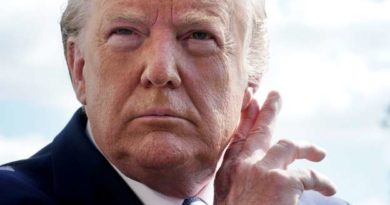OP ED COLUMN: OPINION ON PAGE ONE – Impeaching Trump
I – Impeaching Trump
A technical error occurred in my previous article on the indictment of President Trump’s former lawyer and fixer Michael Cohen in New York, and his former campaign chairman Paul Manafort in Alexandria, Va. Cohen and Manafort did not both plead guilty to the charges against them; only Cohen did — to eight tax evasion and bank fraud charges and paying off two wome with whom Trump had extramarital sex. On his part, Manafort was found guilty of eight financial crimes, and acquitted on 10 other charges when the jury failed to reach a unanimous verdict, and the presiding judge had to throw out the charges.
Trump has not been indicted for anything, yet some have suggested he could be impeached, should the Democrats take the House of Representatives, with a healthy margin, this fall. An article in the current issue of Politico magazine, by its contributing editor Rich Lowry, who is also the editor of the National Review, suggests that Cohen’s campaign-finance violations, which the lawyer said he had committed at the behest of Trump, could give the Democrats “one article of impeachment,” after which they could find others, if they look hard enough.
Ouster predicted
A suggestion by American University professor Allan Lichtman that Trump would likely be impeached in the spring of 2018 is being recycled in the media for the most interesting reason. Lichtman was the first one to ever predict Trump would win in 2016, long before anybody of consequence thought it even remotely possible. No one in Trump’s camp, beginning with Trump himself, ever thought winning was an option. His real aim was to lose big and cash in on his monumental loss on “reality TV.” This is documented for us in Michael Wolff’s “Fire and Fury.”
“A Russian sword of Damocles is hanging over this American president by the slenderest of threads,” Lichtman later wrote. “When this sword falls even Republicans as in the Nixon case will likely be compelled to begin impeachment proceedings.” This is likely to come in the spring of 2018, the professor wrote. Some anti-Trump people apparently thought what happened to Cohen and Manafort was a clear sign that the path to impeachment has opened up.
But some leading Democrats responded with caution. House Minority Leader Nancy Pelosi (D, California) seemed to believe an impeachment proceeding against Trump at this time would be pointless and politically counter-productive. Rep. Adam Schiff, another California Democrat, who used to be a federal prosecutor and is a ranking member of the House permanent select committee on intelligence, feared a move to impeach Trump would be seen as “merely an effort to nullify an election by other means…”
“Even if warranted by the facts, it will be made more difficult politically if part of the country feels removing Trump is ‘the result that some of their fellow Americans were wishing for all along’,” Schiff said. The nation should allow special legal counsel Robert Mueller to complete his investigation into alleged Russian interference in the US elections before taking any decisive action on Trump, he said.
Is it all a ruse?
Still some Republicans are wary that the Democrats are doing a political game of Sun Tzu on them. They are downplaying the idea of impeachment to lure the Trump White House into a false sense of security. This multiplies the Democrats’ chances of success if they eventually decide to go after Trump.
Contributing to this debate, an American reader of this space points out in an email that “the crimes of Paul Manafort are far distant from his brief association with Trump, occurring many years earlier than Trump’s campaign. The crimes did not occur during Trump’s campaign, did not involve Trump’s campaign, as far as I know they stem from 2006… Manafort may have taken extreme measures to protect his assets from taxes, but that is his fiduciary responsibility as a businessman. Our laws are vague regarding offshore monies and other tax matters. It is said here that the typical businessman commits three felonies per day, without knowing so,” he writes.
“As for the other scoundrel, Cohen, he pleaded guilty to crimes that aren’t crimes, in order to save himself from his more serious and real tax evasion charges. It is not a crime to purchase the rights to a Playboy bunny story, even if to bury it. But he is facing probably four years or more in federal prison if he doesn’t give the anti-Trump swamp people some red meat to chew on. We do tend to come down hard on open tax evaders here in the US, the guy is in deep doodoo, so he will say anything.
“Obama and Hillary’s campaigns were rife with violations, some of them resulting in big fines. Did we hear from The New York Times about that?”
The reader seems convinced the NYTimes-led “leftist” press is the real enemy-determined to remove Trump and build a case for impeachment, whether or not there is sufficient legal or political basis for it. This seems to me an exaggerated view of the role of the anti-Trump media.
Clinton’s case
Despite the noticeable shrillness of some of its editorials and columns, when they talk of Trump, some Times columnists have warned against the unhealthy consequences of trying to remove Trump. In a recent column, Charles M. Blow recalled what happened to Bill Clinton. In 1998, Clinton was impeached by the House only to be acquitted by the Senate, where not a single Democrat voted against him and some Republicans crossed party lines in order to vote for him.
“Bill Clinton received the highest approval ratings during the Lewinsky/impeachment controversy,” the columnist wrote. “As the Lewinsky situation unfolded, Clinton’s job approval went up, not down, and his ratings remained high for the duration of the impeachment proceedings. It is quite possible that trying to impeach Trump could have the opposite effect than the one desired. It could boost rather than diminish his popularity and an acquittal by the Senate would leave an even more popular president in office,” the columnist concluded.
For all the many incredible things Trump has done, things which confirmed The Economist’s original description of him as an “Insurgent” in the White House, and which make him occasionally resemble our own President Rodrigo Duterte at close range, I could see him wearing out his critics, but I cannot see him getting impeached. At least not for now.
II – Impeaching our justices
The more sensational impeachment theater is likely to be staged in the Philippine House of Representatives. There Representatives Gary Alejano of Magdalo partylist, Edcel Lagman of Albay, Teddy Baguilat of Ifugao, and Tom Villarin of Akbayan partylist—all members of the so-called Magnificent Seven—have filed an impeachment complaint against seven justices of the Supreme Court for culpable violation of the Constitution and betrayal of public trust.
These include Teresita de Castro, Diosdado Peralta, Lucas Bersamin, Andres Reyes, Francis Jardeleza, Noel Tijam and Alexander Gesmundo.
Their collective crime
They stand accused of trampling upon the Constitution, and putting themselves above it, when they voted to remove Chief Justice Maria Loures Sereno through a “quo warranto” proceeding, initiated by Solicitor General Jose Calida, at the behest of President Duterte, who had denounced her as his “personal enemy,” and demanded her ouster by her colleagues.
All members of the Supreme Court are impeachable officers. Like the President, the Vice President, members of the constitutional commissions, and the Ombudsman, they may be removed only upon death, permanent disability, resignation, impeachment for, and conviction of, culpable violation of the Constitution, treason, bribery, graft and corruption, other high crimes, or betrayal of public trust.
The House shall have the exclusive power to initiate all cases of impeachment; and the Senate shall have the sole power to try and decide all cases of impeachment.
Sereno was already facing an impeachment complaint filed by private lawyer Lorenzo Gadon before the House, and the committee on justice had already found the complaint to be sufficient in form and in substance. There were more than enough votes to impeach Sereno in the House, but not enough votes to convict her in an impeachment trial in the Senate.
In the 2012 impeachment of the late former Chief Justice Renato Corona, 188 congressmen signed the complaint at the behest of then President B.S. Aquino 3rd without reading the document. Then 20 of the 23 sitting senators voted to convict the respondent after they were each promised a bribe of P50 million or more, which 19 of them received after the vote.
Only Sen. Panfilo Lacson voted to convict without receiving any “incentive”; only the late former senator Joker Arroyo, the late former senator Miriam Defensor Santiago, and former senator Ferdinand “Bongbong” Marcos, Jr., who is contesting the seat of Vice President Leni Robredo before the Presidential Electoral Tribunal, voted to acquit the respondent.
Given the unfavorable situation obtaining in the Senate vis-à-vis Sereno, the House leadership froze the impeachment complaint in the committee on justice. Then Solicitor General Calida filed his “quo warranto” petition against Sereno before the Supreme Court.
The high court does not have the power to review the validity of the President’s appointment of any of its members; and no justice may be lawfully removed except on impeachment for, and conviction of, the various grounds enumerated in the Constitution. But that notwithstanding, the members of the court assumed jurisdiction over the unprecedented petition.
Calida’s action had no constitutional basis. The justices’ action had no constitutional basis either. They were all acting outside and beyond the Constitution and the law, effectively tearing apart the Constitution and replacing it with their own individual whimsies. But wonder of wonders, Sereno submitted herself to this absolutely unconstitutional process.
On May 11, 2018, eight of the 15 justices voted to declare Sereno’s 2012 appointment as Chief Justice null and void ab initio. This meant, the justices gave themselves, without a single word of law, the right to review the validity of a previous president’s appointment of SC members.
For some strange reason, the complainants failed to include the eighth justice, Samuel Martires, in their impeachment complaint. He is not less complicit than any of the seven. But before he could warm his bench, he was yanked out of the court and named Ombudsman to succeed Conchita Carpio Morales, who retired last July. At 69, Martires would have had to retire at 70, had he stayed on the court; as Ombudsman he has a fixed term of seven years.
Under a normally functioning constitutional order, the first respondent in the impeachment complaint should have been the President, who struck the first blow against the Constitution and the court and coerced the weak-kneed justices to exercise a power they did not have in order to invalidate a non-reviewable act of the President.
Open-and-shut case
This is an open-and-shut case in which only one outcome is possible: all the respondents must hang, if hanging were still an option.
But not even the formal filing of the impeachment complaint, which Speaker Arroyo said should move quickly, could stop the travesty of justice involving the respondents. In gross defiance of the law, which bars anyone accused of any crime from being nominated to any judicial position, DU30 has just named Justice Teresita de Castro, the first respondent in the impeachment complaint, as the new Chief Justice for a period of two months.
In the US, Trump will likely not be impeached because the Constitution, the rule of law and the political system, for all their problems, are still working. Here, it looks like the President and his justices could never be impeached, whatever their wrongdoing, because the Constitution, the rule of law and the political system have all gone down the drain.
 All photographs, news, editorials, opinions, information, data, others have been taken from the Internet ..aseanews.net | [email protected] |.For comments, Email to :D’Equalizer | [email protected] | Contributor
All photographs, news, editorials, opinions, information, data, others have been taken from the Internet ..aseanews.net | [email protected] |.For comments, Email to :D’Equalizer | [email protected] | Contributor










